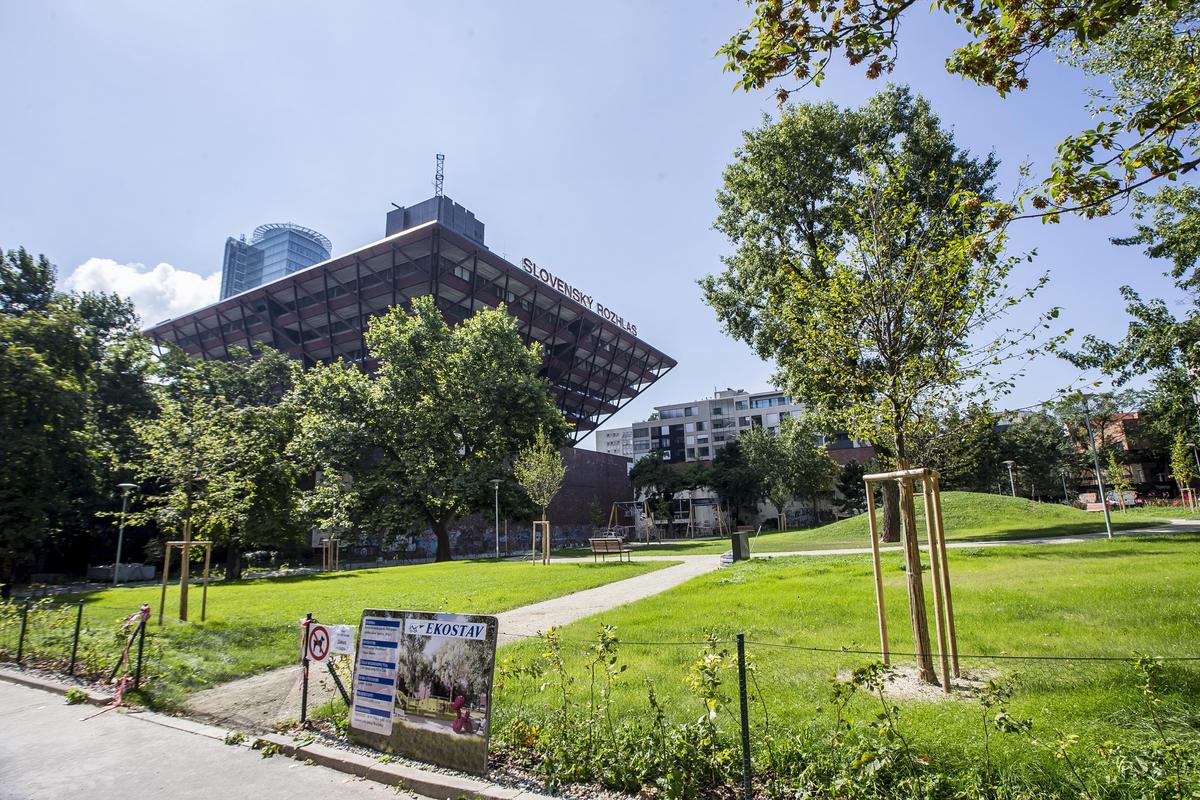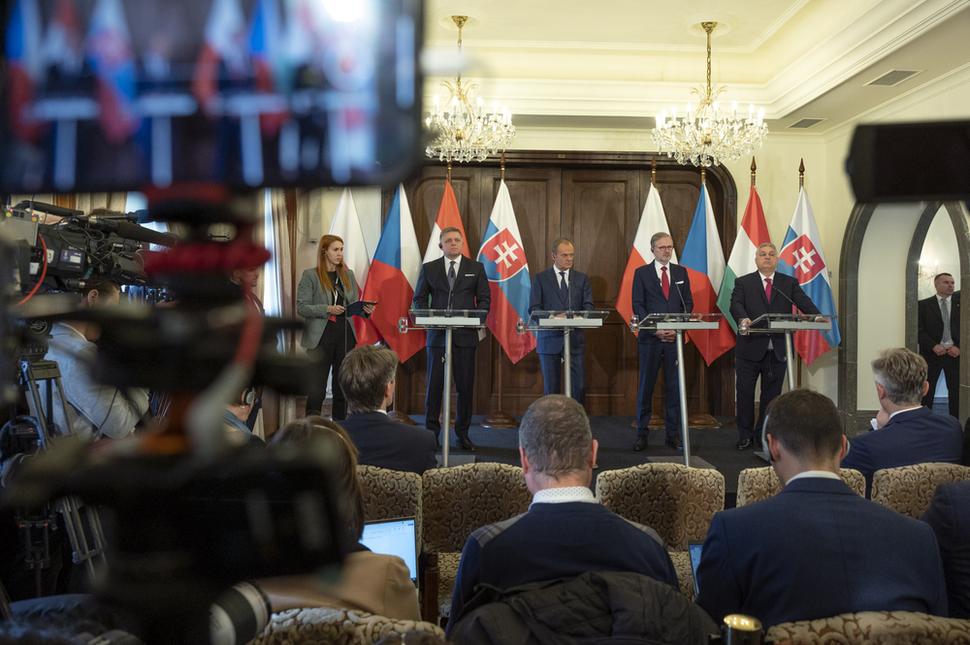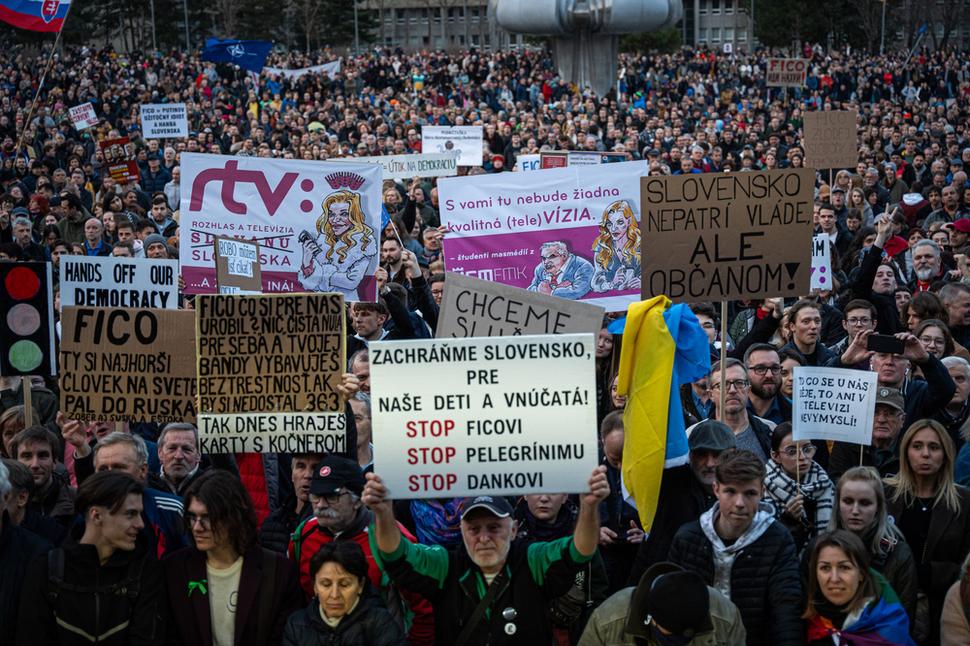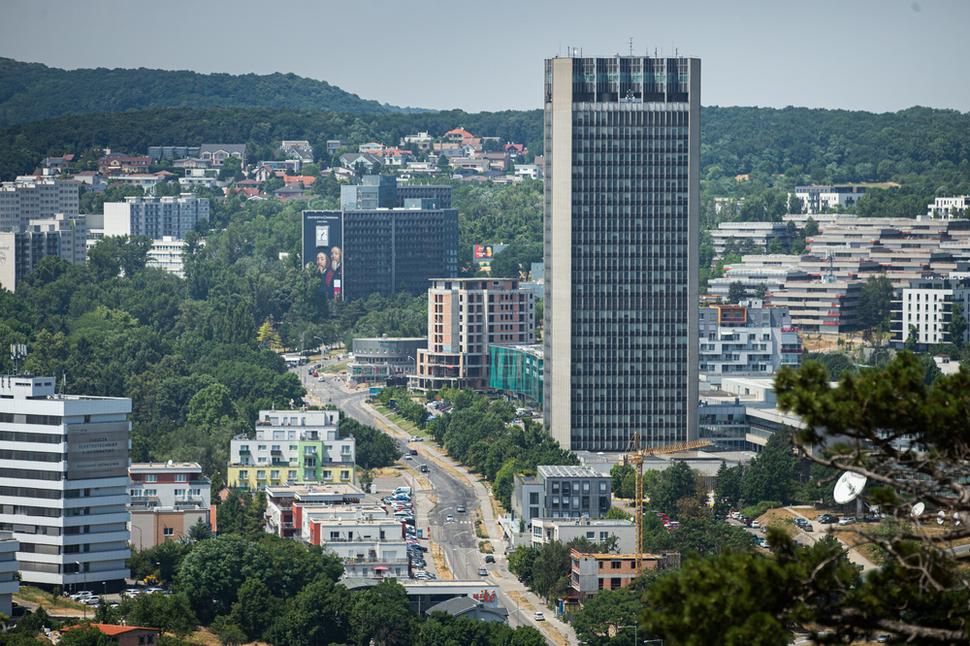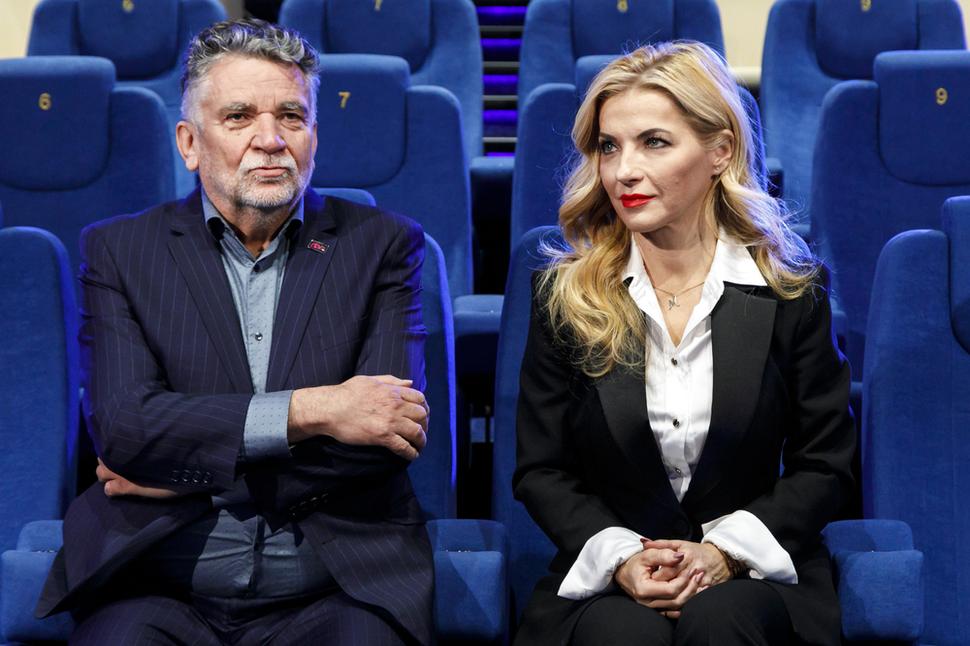This story was produced in partnership withReporting Democracy, a cross-border journalism platform run by the Balkan Investigative Reporting Network.
Slovak Prime Minister Robert Fico appears not to have gotten over a question that foreign correspondent Katarína Vítková of RTVS, the Slovak public service broadcaster, posed at the Visegrad Group summit at the end of February in Prague.
The journalist asked Fico whether he feared that Slovakia would face isolation given his “harsher” rhetoric on, say, the war in Ukraine, giving Hungary as an example of this.
“She lied and attacked the Slovak government,” Fico claimed in a recent interview with the online conservative dailyŠtandard, criticising RTVS and labelling it as a “problem”.
The interview came out a day after Slovakia’s Culture Ministry, which oversees the media in the country, presented a new bill on the broadcaster on March 11. Led by Martina Šimkovičová (SNS nom.), a former TV presenter and notorious star of her own pro-Russian channel on Facebook, the ministry proposes to rename the public service broadcaster STaR (short for Slovak Television and Radio); change the way members of the RTVS Board are elected in order to take full control over the body; dismiss the current RTVS director, Ľuboš Machaj, without providing a reason; and establish a Programme Board to control and co-create RTVS content, both in television and radio.
“RTVS’s news reporting doesn’t shy away from reporting stories in a tabloid fashion, and deploying personal attacks that many times border on violating human and civil rights in RTVS broadcasts,” the Culture Ministry wrote in its proposal, failing to list a single example of this alleged practice.
Despite the state-funded broadcaster enjoying ahigh level of public trust, according to the Reuters Institute for the Study of Journalism and the Median SK research institute, the prime minister is convinced that RTVS journalists come from the liberal media, spread hatred against his coalition government, and threaten human rights because the broadcaster is, Fico claims, biased in its reporting.
“What’s happening in RTVS is unseen – it has nothing to do with public service,” Fico often repeats.
But the public service broadcaster itself, the opposition, media watchdogs and the public protesting on the streets disagree with the three-party coalition, accusing it of trying to turn RTVS into a state propaganda channel.
Fired without grounds
The leader of the opposition Progresívne Slovensko party, Michal Šimečka, believes the coalition plans to use the public service broadcaster as its tool for spreading government propaganda.
It wouldn’t be the first time that the broadcaster has been exploited by a Slovak government: in the 1990s, then semi-autocratic premier Vladimír Mečiar was first to try it – and succeeded; and Fico himself wanted to gaininfluence over the broadcaster when his Smer party took power for the first time in 2006.
“We’ll demand the withdrawal of this harmful legislation and also inform our partners in the EU,” vowed Šimečka.
The government was supposed to submit the bill to parliament this week so that coalition lawmakers could adopt it in April. However, the government decided to delay the bill. The reason may be the presidential election. Given the alleged violation of human rights, Fico wants to see the bill passed in a fast-track legislative procedure and thus without proper debate. The coalition also used this extraordinary method to pass a widely criticised – and currently suspended –amendment to the Penal Code in February.
However, the two other coalition parties, Hlas and the far-right Slovak National Party (SNS), have said in recent days that a parliamentary debate on the media bill should last until the start of the summer.
“The legislative process, I can assure you, won’t be a fast-track legislative procedure,” Culture and Media Parliamentary Committee Chair Roman Michelko (SNS) told RTVS.
Yet a few days later, Michelko was no longer so sure: “If there were such a thing [fast-track procedure], it’d be a political decision.”
What’s already certain is that the bill will have to undergo several changes because it isn’t in line with EU legislation after the recent adoption of theEuropean Media Freedom Act. Among other things, the new EU legislation doesn’t allow politicians to sack the head of the public service media arbitrarily.
“This regulation is a response to Orbán, Fico, Janša, Putin and those who want to transform media into their own propaganda tools or spread fake news and destabilise our democracies,” MEP Ramona Strugariu was quoted in the European Parliament’spress release as saying.
As such, the proposed provision that would allow the new seven-member RTVS Board, a body now to be selected by the coalition-controlled parliament and the culture minister, to dismiss the public-service broadcaster’s director without any reason will likely have to be removed from the bill.
The bill also has the RTVS Board assuming the power to elect the director. Until now, the director and members of the RTVS Board have been elected by parliament with a simple majority.
“The bill is in accordance with EU legislation, except for the provision that the RTVS Board can dismiss the director without giving a reason, and we will respect that,” the Culture Ministry’s chief of staff, Ľuboš Machala, said.
Machala, who openly expresses his admiration for Russian President Vladimir Putin on Telegram, helped draft the bill.
Several opposition parties had submitted collective comments by the time a shortened inter-department comment procedure ended earlier last week. For example, more than 11,000 people signed under the SaS party’s collective comment, which the ministry will now have to deal with.
“The bill turns the public service radio and television into a state medium,” said the SaS party’s culture expert René Parák.
In total, over 40 collective comments and almost 400 individual comments on the draft legislation had been submitted by March 19. The ministry claims that this is the reason why it had to delay the submission of the bill. The opposition doubts this.
Moreover, four days after the ministry unveiled the bill, around15,000 people took part in opposition-led protests in Bratislava and Košice, the two largest Slovak cities, in support of RTVS.
Programme Board as censor
European Commission Vice-President Věra Jourová, who is responsible for values and transparency in the bloc, said she’s been following the situation concerning the Slovak public service broadcaster very closely.
“In every country there should be strong public service media, and not media that will serve as mouthpieces of a party and a government,” Jourová said, adding that she wants to meet Culture Minister Šimkovičová to discuss the bill.
Last year, the European Commission wrote in its annual rule of lawreport on Slovakia that the country should improve “the independent governance and editorial independence of public-service media”. Yet various media watchdogs and organisations point out that the opposite is now happening. The European Broadcasting Union has called the presented bill “a thinly veiled attempt to turn the Slovak public service broadcaster into state-controlled media.” Reporters Without Borders and seven other international organisations have called on the government to withdraw the bill, as have more than 40 organisations in Slovakia and the Czech Republic. More than 60,000 people have, moreover, signed an open letter, initiated by six Slovak media and anti-corruption organisations, that will be sent to EU institutions in the near future.
Media watchdogs all see a problem with the proposed Programme Board, an 11-member body to be elected by parliament. As the legislation stands, this Programme Board could intervene in RTVS broadcasts, including its news programmes.
Media analystIvan Godársky from the Memo 98 organisation told Denník N that the body would essentially serve as a censor, pointing out that the coalition used totalitarian language when describing the job of the Programme Board in the bill.
Smer’s former culture minister Marek Maďarič shares Godársky’s view. “Considering the style of changes and the way in which these bodies of the public service broadcaster will be created, we can safely perceive the Programme Board as a political censorship body of the government,” Maďarič told Denník N.
Although the coalition parties have criticised the public service broadcaster for allegedly being liberal and biased, the SNS party is now claiming that it couldn’t care less about its news programmes. “Our videos on social networks have a bigger reach than RTVS news programmes,” Environment Minister Tomáš Taraba (SNS nom.) told the press, describing RTVS as a junk broadcaster.
Hlas leader Peter Pellegrini, who is on course to become the next Slovak president, said this week that he’d never allow “someone from the politburo to censor what should be broadcast in the news”. Yet Pellegrini also doesn’t think there is anything wrong with the government wanting to influence the operation of certain institutions, and has asked RTVS employees to wait for the final version of the bill.
More than 1,200 employees, supported by severalhundreds of journalists from other Slovak media outlets, have called on the government to withdraw the bill. The directors of Czech Radio and Czech Television, the public service broadcasters in next-door Czechia, have also stood up for RTVS.
“This [bill] is undoubtedly an initial step towards the nationalisation of the public service media in Slovakia and the suppression of its free and objective broadcasting,” the director of Czech Radio, René Zavoral, said.
Slovak President Zuzana Čaputová said in a statement that she sees no real reason to cancel RTVS and rebrand it as STaR, other than an effort to take over the public service broadcaster politically.
Coalition wants better RTVS, yet cuts its budget
The coalition, needless to say, doesn’t see it that way, arguing that it only wants to transform the underfunded public service broadcaster from an “open-air museum” into a prosperous institution with better working conditions for employees and objective reporting.
At a recent press conference, SNS leader Andrej Danko said that journalists from commercial media “wouldn’t even have the courage to go to the loo in RTVS”, referring to the dilapidated state of the broadcaster’s headquarters in Bratislava. He then went on to attack RTVS director Ľuboš Machaj – a frequent target of the coalition. Danko’s environment minister, Tomáš Taraba, referred to Machaj as “an indebted homeless person” and criticised RTVS contracts that he has struck with external suppliers.
Machaj has been open about his personal bankruptcy situation, which is linked to a loan that he took out many years ago to save Radio Twist – a station that played a key role in defending democracy in the 1990s when the semi-autocratic premier Vladimír Mečiar ruled the country and controlled the public service broadcaster.
“I rule out that, as [Environment Minister Tomáš] Taraba has suggested, I would exploit external firms to solve my situation,” Machajtold Denník N.
In fact, without these firms, the underfinanced RTVS wouldn’t have produced many of the popular programmes and films that it has in recent years. As of July 2023, the 4.64-euro monthly licence fee, which hadn’t been raised for two decades, was eventually scrapped and RTVS was supposed to receive 0.17 per cent of GDP every year instead. The current government, however, reduced this to 0.12 per cent last December, citing the need to consolidate the public finances.
The new bill doesn’t change the percentage. Instead, the coalition mentions increasing the advertising share for RTVS and the reintroduction of a “contract with the state”, through which the state would order production of a certain number of programmes in the public interest and pay for them. The latter is said to be removed from the bill.
Nor do reports attached to the bill explain in what way European countries such as Italy and Norway have inspired the bill, something the coalition boasts about. The coalition also claims the bill is in response to discontent voiced by various groups, but it has mentioned no specific organisation or name to date. Machaj says that the Council for Media Services, a national oversight body for the media sector, has identified only two minor issues under his management since he took office two years ago.
“I’m convinced that the coalition is not trying to solve problems based on facts, but only on assumptions,” Machajsaid.
In fact, he believes that 95 per cent of the bill is identical with the current one and the only goal of the bill is to get rid of him. “Only the instruments of power influence have changed [in the bill]. I experienced censorship under Communism, and this is close to it,” the RTVS director said.
He added that he won’t give up: “I will fight for the independence of RTVS until the last possible moment.”
If the coalition gets its way, that moment will come sooner than later.


